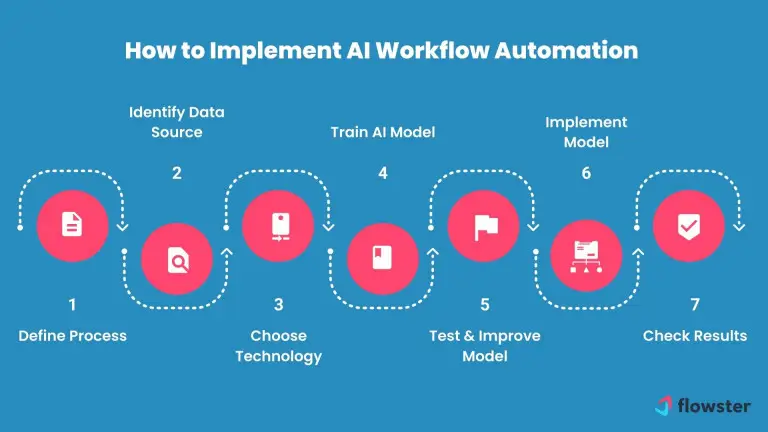
AI for Workflow Automation: Transforming Business Processes and Enhancing Efficiency
AI for Workflow Automation: Transforming Business Processes
Estimated reading time: 7 minutes
Key Takeaways
- Enhanced Efficiency: AI automates repetitive tasks, boosting overall productivity and employee satisfaction.
- Reduced Errors: AI-driven automation can decrease mistakes by up to 70%, ensuring smoother operations.
- Improved Decision-Making: AI provides real-time insights and predictive analytics for more informed decisions.
- AI vs. Manual Processes: AI automation offers superior speed, accuracy, and scalability compared to manual workflows.
- Future Trends: Generative AI and hyper-automation are set to further transform business processes.
Table of contents
- Understanding AI for Workflow Automation
- How AI Improves Business Processes
- AI Automation vs. Manual Processes
- Machine Learning in Workflow Optimization
- Intelligent Process Automation Examples
- Implementation Strategies for AI Workflow Automation
- Future Trends in AI for Workflow Automation
- Conclusion
- Additional Resources
- Frequently Asked Questions
In the modern business world, where efficiency and innovation are key, AI for workflow automation is a game-changer. As businesses strive for higher productivity, reduced costs, and increased employee satisfaction, understanding how AI enhances business processes becomes crucial. By automating repetitive tasks, minimizing errors, and enabling data-driven decision-making, AI is revolutionizing workflow processes across various sectors.
Understanding AI for Workflow Automation
AI in the context of workflow automation refers to the application of advanced technologies, including machine learning, natural language processing, robotic process automation (RPA), and intelligent process automation (IPA), to streamline and optimize business operations. These technologies enable businesses to operate more efficiently by seamlessly integrating intelligence into daily workflows, making them more adaptable and predictive.
How AI Improves Business Processes
- Enhanced Efficiency: Automation frees employees from mundane tasks, allowing them to focus on more valuable activities. This shift boosts overall productivity and workplace satisfaction.
- Reduced Errors: AI-driven automation can reduce mistakes by up to 70%, ensuring smoother operations and fewer disruptions.
- Improved Decision-Making: AI provides real-time insights and predictive analytics, making decision-making more informed and forward-looking.
Automation improves efficiency by 40-60% and typically offers a return on investment within 12 months, highlighting its effectiveness in transforming business operations (source: Feathery).
AI Automation vs. Manual Processes
In the debate of AI automation vs. manual processes, the former offers significant advantages. AI-driven workflows provide:
- Speed: Automated processes are faster, cutting down on processing time.
- Accuracy: AI reduces inconsistencies and errors significantly, with some studies showing up to 90% error reduction.
- Scalability: Businesses can grow without the need to expand their workforce proportionately.
A testament to these benefits is the statistic that 90% of IT professionals report increased business growth due to automation (source: ZIPHQ).
Machine Learning in Workflow Optimization
Machine learning, a key component of AI for workflow automation, is pivotal in workflow optimization. By learning from data, these models can predict workflow bottlenecks, forecast demand, and reduce downtime, leading to continuous improvement. This adaptability ensures that AI systems keep processes efficient and smart.
Intelligent Process Automation Examples
- Finance: Automation helps in detecting fraud and ensuring regulatory compliance efficiently.
- Human Resources: AI-powered tools streamline candidate screening and employee onboarding processes, resulting in significant cost savings.
- Customer Service: Chatbots handle common inquiries and triage tickets, enhancing customer satisfaction levels by 6.7% (source: ZIPHQ).
Such implementations not only reduce costs by up to 30% in HR but also demonstrate how AI improves business processes across sectors.
Implementation Strategies for AI Workflow Automation
- Evaluate Processes: Identify areas that would benefit the most from automation.
- Select Tools: Choose AI platforms suited to specific needs.
- Plan Deployment: Implement in phases, with continuous monitoring for improvements.
Challenges such as resistance to change, data quality, and tech integration must be addressed. Key to a successful rollout are leadership support and continuous employee training, ensuring that AI deployment is well-managed and effective.
Future Trends in AI for Workflow Automation
Looking ahead, AI for workflow automation is set to further evolve. Trends such as generative AI, hyper-automation, and advanced predictive modeling will redefine workflows. As over 90% of executives plan to increase AI spending (source: McKinsey and Kissflow), this will lead to more personalized workflows, real-time decision-making, and autonomous business processes.
Conclusion
AI for workflow automation enhances efficiency and accuracy, enabling businesses to operate more effectively than ever before. By cutting costs, reducing errors, and enhancing decision-making, AI is crucial for maintaining competitiveness in today’s fast-paced market. Businesses are encouraged to embrace AI-based workflow solutions to secure long-term success.
Additional Resources
- Discover workflow automation platforms and tools.
- Read case studies and guides on AI implementation.
- Explore detailed insights into how AI can transform your business operations.
Frequently Asked Questions
- What is AI workflow automation?
A: It involves using artificial intelligence technologies like machine learning and RPA to streamline and optimize business processes. - How does AI reduce errors in business processes?
A: AI-driven automation minimizes human intervention, which significantly decreases the likelihood of mistakes. - What are the future trends in AI for workflow automation?
A: Trends include generative AI, hyper-automation, and advanced predictive modeling, which will further enhance and personalize workflows.
}